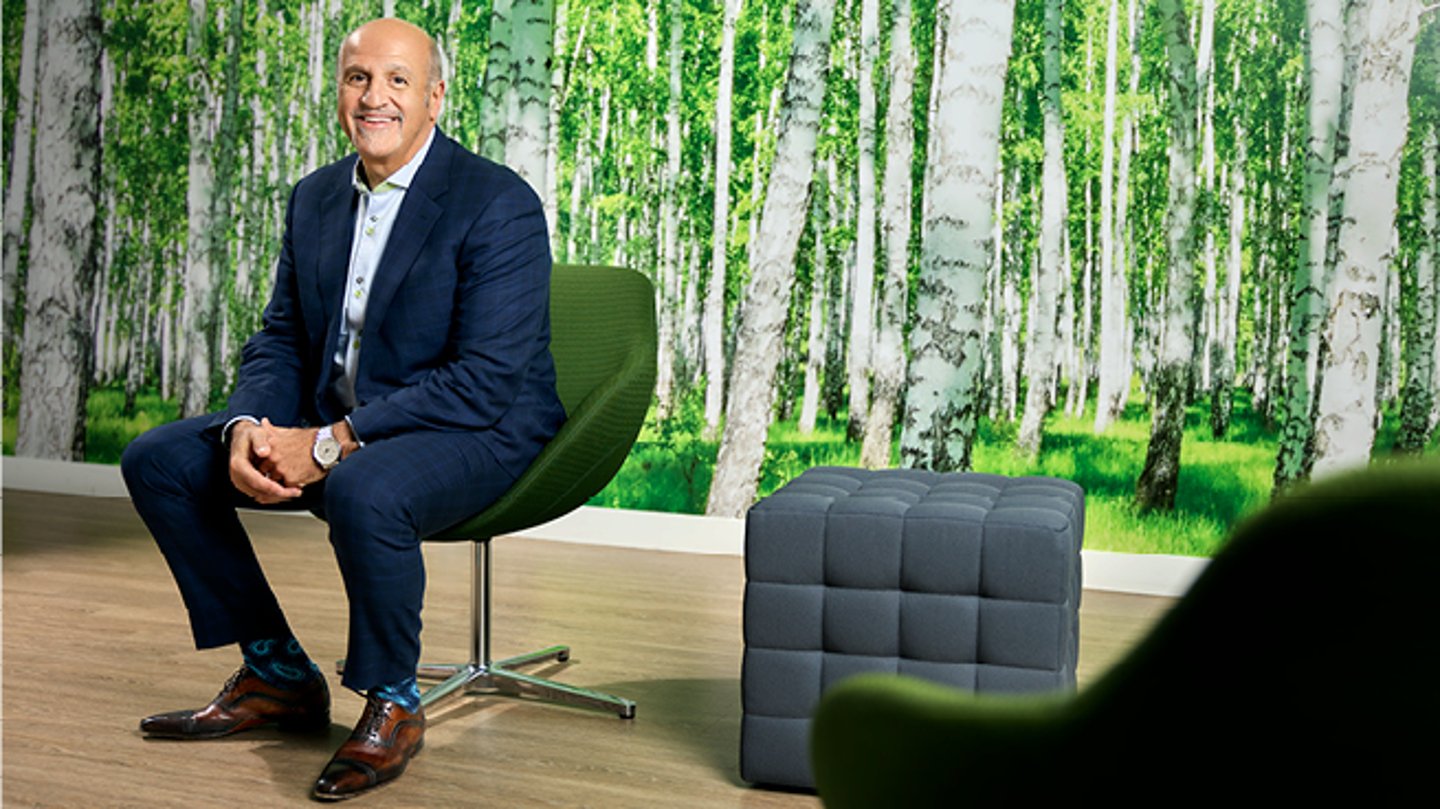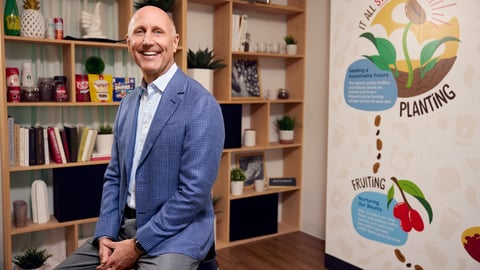The Leaders: Lessons from Dino Bianco, CEO, Kruger Products
How did you get your start in the business?
When I graduated in finance, I was working for Christie Brown as a sales rep. I loved the job and they asked me to join full time and I thought, you know what, I’ve got to go do my CPA because if I don’t do it now, I’ll never do it. I ended up doing my CPA [while at PricewaterhouseCoopers] and, long story short, I joined Kraft—later became president of Kraft—and then Kraft bought Christie Brown and people I had worked with when I was 22 were still there. An interesting journey!
What is your leadership story?
I can’t tell my leadership story without telling my personal story. First off, being the oldest son of an immigrant family, the need to explore and be independent and figure things out myself came early. The second piece was I played competitive sports, so that was very shaping in terms of leadership and team roles and working hard. And then the third piece that shaped me was my mother passed away at a young age, and so I had to grow up quickly and it helped me mature and [develop] a sense of responsibility. All those things, and then growing up poor, I realized if I was going to get out of this, I had to do it myself. I had to control my future.
READ: Kruger Products CEO Dino Bianco to receive 2024 Canadian Grand Prix Lifetime Achievement Award
And the characteristic that I think shaped the leader I am is curiosity. They say curiosity killed the cat but for me, curiosity created the CEO. It’s wanting to know how things work, why they work, why people do what they do, why they don’t do what they’re supposed to do, why decisions get made, why the politics get involved, why do we look at the short term, not long term? It was always about the why and trying to figure it all out. This drove me to embark on cross-functional moves through my career. I was a finance guy and then I really had curiosity to learn how the business worked—I moved into sales and then I moved into marketing and strategy and then, ultimately, became the president. But, it was really this capability-building in my career, driven by curiosity and learning, that prepared me to continue to take on roles later in my career.
How do you stay inspired and continue to grow as a leader?
Doing things for a purpose, whether the purpose is to turn around a company or to bring more inclusion in our company, removing barriers or leaving the Earth in a better place. And for me, that gives me excitement—innovation and new things. And then, ultimately, it’s about the people and the team. I get motivated by working with smart, energized, great people, even if we’re failing or succeeding, just to be surrounded by people that care, that want to do better, that care about each other. And, you know, to teach and learn— you’ve got to bring both those pieces into your toolbox. That’s what motivates me and I’m 38 years into it, and still going.
READ: Bonterra unveils interactive mural in downtown Toronto
What is the biggest risk you took in your career and what did you learn from it?
Moving from the cocky finance guy who knew everything to sales where I was the dumbest guy in the room. I really didn’t know [about sales] and so I had to learn a lot about selling, which was so important. But I did a bunch of crossfunctional moves and every one made me very uncomfortable, but every one made me more curious, more willing to learn and understand and listen better. And I learned something along the way I wasn’t expecting, besides learning the technical sides of those roles, I learned how organizations work and I learned how people come together or become dysfunctional. That really helped me as I became president and now CEO.
Have you had a mentor that has made a positive impact on your career?
I never had a formal mentor. I treated mentors like a buffet table; I would pick and choose the great traits of different [leaders] I observed. And sometimes, I learned more from things I didn’t like than from things I liked. I remember thinking, ‘I don’t want to be like him. Boy, how did he react to that situation? He just killed the culture, killed the energy in the room.’
PHOTO GALLERY: Kruger’s 2024 Cashmere Collection show
How do you approach making difficult decisions?
The worst piece of advice I ever got was ‘don’t make business personal!’ That was such a cold response, because business is personal for me. I pour myself into it. Maybe it’s not good for my health, but it is good for me as a leader. I take success and failure personally. I take people’s reactions and responses and sensitivities personally; I take failure personally. And for me, that helps me internalize the difficult situation, and once I get through it analytically—if we have to close a factory or lay off people—I understand it’s the right decision. And then on the emotional front, I generally put myself in the position of who I’m speaking to. I try to understand the human impact of that decision, not just on a person but the culture of the department or the geography or whatever it may be.
What is one lesson you wish you’d learned earlier in your career? And what advice do you have for up-and-coming leaders?
When you’re young, you think your job is to learn, develop and maybe be involved in small decisions; you underestimate your ability to make an impact. And you think more senior people don’t want to hear from you because you’re only three years out of school, what do you know? Now, as a leader, I look at the young people coming in and I want them hitting the road running. I want them to teach me. As Steve Jobs said, ‘it doesn’t make sense to hire smart people and tell them what to do; we hire smart people so they can tell us what to do,’ and I feel the same way. I want great people who can tell me about AI, about sustainability and saving the planet. To tell me about diversity, equity and inclusion, social media— some of these things I didn’t grow up with; I want this generation to tell me. So, don’t underestimate the ability you have to make an impact and contribute to an organization.
How do you define success as a leader?
Obviously, there’s a scorecard of the P&L and the results and that is very important and it drives the energy of the organization. That’s one, but the real one, and I can reflect on it now having a career in this industry for a long time, is the impact you have on people. I can’t remember my results from 10 years ago, but I can remember the VP of marketing I had who is now CMO of a big organization, and I had some role in that. I’ve always believed the biggest job of leaders is to create other leaders, and I feel very blessed to have been able to impact people from so many different areas of the business and watch them succeed.
This interview has been edited for clarity and length.
This article was first published in Canadian Grocer’s December2024/January 2025 issue.




